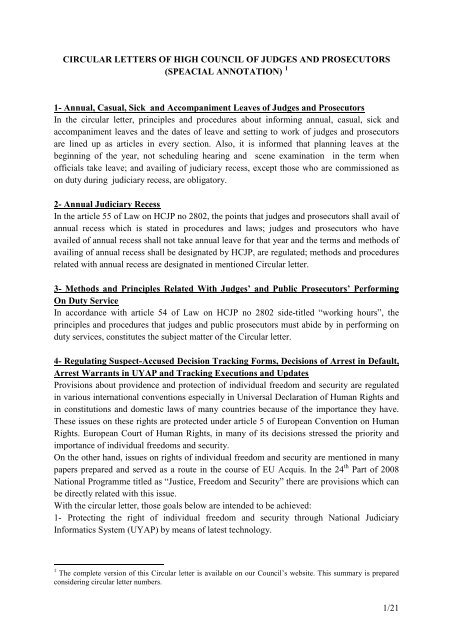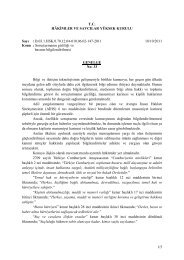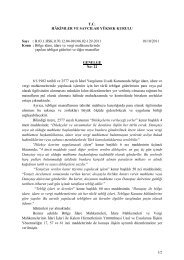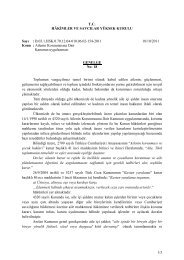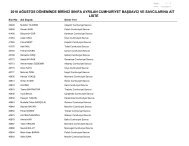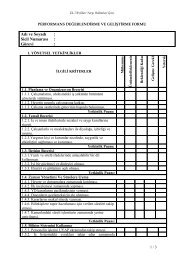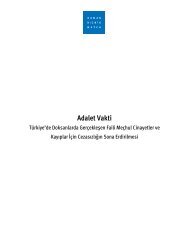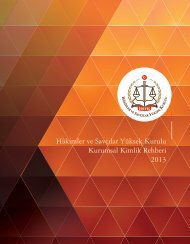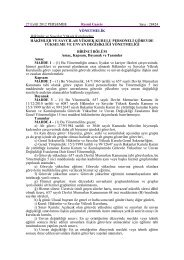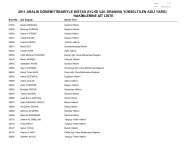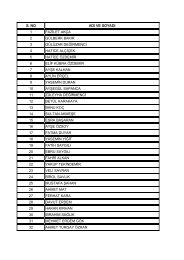Read More.. - High Council of Judges and Prosecutors
Read More.. - High Council of Judges and Prosecutors
Read More.. - High Council of Judges and Prosecutors
- No tags were found...
Create successful ePaper yourself
Turn your PDF publications into a flip-book with our unique Google optimized e-Paper software.
CIRCULAR LETTERS OF HIGH COUNCIL OF JUDGES AND PROSECUTORS<br />
(SPEACIAL ANNOTATION) 1<br />
1- Annual, Casual, Sick <strong>and</strong> Accompaniment Leaves <strong>of</strong> <strong>Judges</strong> <strong>and</strong> <strong>Prosecutors</strong><br />
In the circular letter, principles <strong>and</strong> procedures about informing annual, casual, sick <strong>and</strong><br />
accompaniment leaves <strong>and</strong> the dates <strong>of</strong> leave <strong>and</strong> setting to work <strong>of</strong> judges <strong>and</strong> prosecutors<br />
are lined up as articles in every section. Also, it is informed that planning leaves at the<br />
beginning <strong>of</strong> the year, not scheduling hearing <strong>and</strong> scene examination in the term when<br />
<strong>of</strong>ficials take leave; <strong>and</strong> availing <strong>of</strong> judiciary recess, except those who are commissioned as<br />
on duty during judiciary recess, are obligatory.<br />
2- Annual Judiciary Recess<br />
In the article 55 <strong>of</strong> Law on HCJP no 2802, the points that judges <strong>and</strong> prosecutors shall avail <strong>of</strong><br />
annual recess which is stated in procedures <strong>and</strong> laws; judges <strong>and</strong> prosecutors who have<br />
availed <strong>of</strong> annual recess shall not take annual leave for that year <strong>and</strong> the terms <strong>and</strong> methods <strong>of</strong><br />
availing <strong>of</strong> annual recess shall be designated by HCJP, are regulated; methods <strong>and</strong> procedures<br />
related with annual recess are designated in mentioned Circular letter.<br />
3- Methods <strong>and</strong> Principles Related With <strong>Judges</strong>’ <strong>and</strong> Public <strong>Prosecutors</strong>’ Performing<br />
On Duty Service<br />
In accordance with article 54 <strong>of</strong> Law on HCJP no 2802 side-titled “working hours”, the<br />
principles <strong>and</strong> procedures that judges <strong>and</strong> public prosecutors must abide by in performing on<br />
duty services, constitutes the subject matter <strong>of</strong> the Circular letter.<br />
4- Regulating Suspect-Accused Decision Tracking Forms, Decisions <strong>of</strong> Arrest in Default,<br />
Arrest Warrants in UYAP <strong>and</strong> Tracking Executions <strong>and</strong> Updates<br />
Provisions about providence <strong>and</strong> protection <strong>of</strong> individual freedom <strong>and</strong> security are regulated<br />
in various international conventions especially in Universal Declaration <strong>of</strong> Human Rights <strong>and</strong><br />
in constitutions <strong>and</strong> domestic laws <strong>of</strong> many countries because <strong>of</strong> the importance they have.<br />
These issues on these rights are protected under article 5 <strong>of</strong> European Convention on Human<br />
Rights. European Court <strong>of</strong> Human Rights, in many <strong>of</strong> its decisions stressed the priority <strong>and</strong><br />
importance <strong>of</strong> individual freedoms <strong>and</strong> security.<br />
On the other h<strong>and</strong>, issues on rights <strong>of</strong> individual freedom <strong>and</strong> security are mentioned in many<br />
papers prepared <strong>and</strong> served as a route in the course <strong>of</strong> EU Acquis. In the 24 th Part <strong>of</strong> 2008<br />
National Programme titled as “Justice, Freedom <strong>and</strong> Security” there are provisions which can<br />
be directly related with this issue.<br />
With the circular letter, those goals below are intended to be achieved:<br />
1- Protecting the right <strong>of</strong> individual freedom <strong>and</strong> security through National Judiciary<br />
Informatics System (UYAP) by means <strong>of</strong> latest technology.<br />
1 The complete version <strong>of</strong> this Circular letter is available on our <strong>Council</strong>’s website. This summary is prepared<br />
considering circular letter numbers.<br />
1/21
2- Preparing forms, decisions <strong>and</strong> orders in electronic environment that are attached to<br />
circular letter,<br />
3- Providing cooperation <strong>and</strong> coordination between judicial authorities <strong>and</strong> law enforcement<br />
<strong>of</strong>ficers at high levels,<br />
4- Providing integration <strong>of</strong> Department <strong>of</strong> Smuggling, Intelligence, Operations <strong>and</strong><br />
Information Gathering(KIHBI) with UYAP,<br />
5- Preventing unjust arrests <strong>and</strong> detentions,<br />
6- Reminding approaches <strong>of</strong> ECHR to those concerned,<br />
7- Rendering operations on extradition quicker <strong>and</strong> more proper since in the cases <strong>of</strong><br />
requests on extradition, especially terrorism <strong>of</strong>fenders, addressed to EU member states, our<br />
requests are returned with the reason that the arrest warrants which only contain expressions<br />
such as “the characteristics <strong>and</strong> nature <strong>of</strong> the crime <strong>and</strong> existing evidences” in terms <strong>of</strong><br />
determining causality between the alleged crime <strong>and</strong> the concrete actions <strong>of</strong> the accused are<br />
not arrest warrants in the scope <strong>of</strong> article 12 <strong>of</strong> European Convention on Extradition,<br />
(Supplemental -4)<br />
In the Circular letter; the integration <strong>of</strong> UYAP <strong>and</strong> KIHBI is discussed <strong>and</strong> as <strong>of</strong> January 1 st<br />
2012 it is aimed that only UYAP Information System <strong>of</strong> Those Wanted will be used. So that,<br />
the expedition <strong>of</strong> judicial procedure will be enhanced.<br />
For instance, as no operation is performed in physical setting, with just a click, documents<br />
will be transmitted electronically; <strong>and</strong> consequently, delays caused by human factor will<br />
disappear <strong>and</strong> abuses caused by human factor will be prevented.<br />
In former practices, after an arrest warrant had been issued, it was signed <strong>and</strong> then it was sent<br />
to the enforcement <strong>of</strong>ficers by mail or against custodianship after being registered in related<br />
book <strong>and</strong> the enforcement <strong>of</strong>ficers would register it into KIHBI.<br />
In this field, approximately 2250 police <strong>of</strong>ficers in security department, 450 gendarmerie in<br />
Gendarmerie comm<strong>and</strong> which make total 2700 were employed nationwide. This number<br />
shows the persons who are only assigned for registering, tracking <strong>and</strong> revoking this kind <strong>of</strong><br />
documents. Those operations are already available in UYAP Information System <strong>of</strong> Those<br />
Wanted. <strong>More</strong>over, there is no need to repeat the same operation. This nothing else but waste<br />
<strong>of</strong> time, labour <strong>and</strong> effort.<br />
With respect to this, in accordance with the protocols signed in 2006, as there is the obligation<br />
in using a single information source for those operations which is a natural consequence <strong>of</strong> the<br />
studies, meetings, negotiations <strong>and</strong> test executions carried out so far, this circular letter has<br />
been issued.<br />
There are positive experiences resulting from the implementation <strong>of</strong> UYAP in similar fields.<br />
For instance, with the change made in <strong>High</strong>way Traffic Law, thanks to the possibility <strong>of</strong><br />
judges’ <strong>and</strong> bailiffs’ executing operations <strong>of</strong> imposing restriction on records <strong>of</strong> vehicles in<br />
database directly, that is levying <strong>and</strong> releasing electronically via UYAP <strong>and</strong> POL-NET; so far<br />
about 4 million restrictions have been imposed <strong>and</strong> 1,5 million <strong>of</strong> them have been released.<br />
When only the costs <strong>of</strong> mailing is calculated for these documents, the total cost <strong>of</strong> 5,5 million<br />
restriction imposing <strong>and</strong> releasing writs is 27,5 million Turkish Liras. Also, some possible<br />
abuses which result from intervention <strong>of</strong> human factor have been prevented. With these, 2<br />
thous<strong>and</strong> traffic police <strong>of</strong>ficers who were in charge only for the operations before, have<br />
returned to their fundamental duties. As can be seen in this example, with this Circular letter<br />
2/21
not only saving in terms <strong>of</strong> labour, effort, time, costs <strong>and</strong> workforce will be achieved but also<br />
assuring rights <strong>and</strong> freedoms <strong>of</strong> those concerned will be provided.<br />
To achieve these benefits, forms attached to the Circular Letter need to be created, properly<br />
registered, tracked, updated <strong>and</strong> deleted or removed in UYAP Informatics System. Until<br />
January 1 st 2012 joint use <strong>of</strong> UYAP <strong>and</strong> KIHBI will be taken as base but following the date<br />
for the queries that will be conducted, the records <strong>of</strong> UYAP will be taken as base.<br />
5- Decisions on Bringing by Force<br />
In the Circular letter, some problems seen in the implementation <strong>of</strong> bringing by force are<br />
referred to <strong>and</strong> significant principles adopted by ECHR such as abiding by the principle <strong>of</strong><br />
proportion, ultimate remedy principle in the cases <strong>of</strong> children <strong>and</strong> documenting <strong>of</strong> bringing by<br />
force are reminded.<br />
As stated in the summary related with the Circular letter no (4), it is considered that this<br />
Circular letter includes issues on individual freedom <strong>and</strong> security <strong>and</strong> will provide assurance<br />
in terms <strong>of</strong> this right.<br />
6- Execution <strong>and</strong> Probation Operations<br />
In National Programme 2008, it was expressed that discrimination is criminalized in “Turkish<br />
Penal Code” <strong>and</strong> also discrimination in execution was set forth in Law on Execution <strong>of</strong><br />
Sentences <strong>and</strong> Security Measures <strong>and</strong> it was also stated that studies will be carried on to make<br />
penal institutions comply with international st<strong>and</strong>ards <strong>and</strong> probation services will be activated<br />
<strong>and</strong> generalized.<br />
In EU Progress Reports <strong>and</strong> Advisory Visit Reports, it is stated that judicial system must be<br />
efficient. Execution <strong>of</strong> sentence <strong>and</strong> security measures constitutes a significant part <strong>of</strong> this<br />
system. Execution <strong>of</strong> the decisions rendered by the courts is the indicator <strong>of</strong> the system which<br />
operates as a whole.<br />
In this context, in the Circular letter certain parts <strong>of</strong> the system where problems <strong>of</strong>ten occur<br />
are evaluated with their titles <strong>and</strong> practical considerations are stated; <strong>and</strong> expediting<br />
execution, ending the complexity in that part <strong>of</strong> the system <strong>and</strong> consequently providing a<br />
rapid execution <strong>of</strong> the sentences <strong>and</strong> security measures are targeted.<br />
The provisions mentioned in the Circular letter also comply with Judicial Reform Strategic<br />
Paper <strong>and</strong> other plans which were accepted by our country.<br />
Negotiations were held with <strong>of</strong>ficials <strong>of</strong> Ministry <strong>of</strong> Justice, Information Processing<br />
Department, extending the use <strong>of</strong> UYAP is pointed out <strong>and</strong> so that expediting execution can<br />
be provided.<br />
Accordingly, in the Circular letter, the principles that in terms <strong>of</strong> execution <strong>of</strong> sentences,<br />
execution documents shall be obtained in UYAP <strong>and</strong> physical documentation shall be<br />
revoked; in terms <strong>of</strong> providing the registration <strong>and</strong> tracking <strong>of</strong> decisions, execution operations<br />
shall be registered using electronic signature according to the file types in UYAP system<br />
(execution, docket or general book <strong>of</strong> probation etc.) <strong>and</strong> they shall be controlled are set forth;<br />
<strong>and</strong> important issues that must be taken into consideration <strong>and</strong> obeyed in execution <strong>of</strong><br />
sentences <strong>and</strong> security measures are underlined.<br />
3/21
In the Circular letter, the issues; Collecting judicial <strong>and</strong> administrative fines, Supervising<br />
convicts who are on probation, Postponing execution <strong>of</strong> prison sentences because <strong>of</strong> health<br />
problems, Depriving <strong>of</strong> exercising certain rights, the state when executed prison term does<br />
not cover the decreed judicial fine, Execution <strong>of</strong> decisions <strong>of</strong> preventative detention, <strong>High</strong><br />
security health institutions, Execution <strong>of</strong> Probation decisions, Non-liability supervision,<br />
Decisions <strong>of</strong> treatment <strong>and</strong> probation designated about the persons who are addicted to<br />
narcotic drugs or stimulant, Probation decisions rendered about persistent violators to be<br />
executed after the execution <strong>of</strong> sentence, are designated as titles <strong>and</strong> are then conveyed to<br />
implementers in detail.<br />
7- Duties, Powers <strong>and</strong> Responsibilities <strong>of</strong> Enforcement Officers<br />
In Political Criteria part <strong>of</strong> Accession Partnership Document 2008, the need <strong>of</strong> empowering<br />
<strong>and</strong> developing all law enforcement bodies, developing their status <strong>and</strong> functions <strong>and</strong><br />
collaboration among bodies <strong>and</strong> so that providing compliance with EU st<strong>and</strong>ards, are set as<br />
priorities.<br />
In 2008 National Programme, determination was expressed to regulate responsibilities,<br />
powers <strong>and</strong> duties <strong>of</strong> enforcement <strong>of</strong>ficers <strong>and</strong> prosecutors in investigation <strong>and</strong> prosecution on<br />
the basis <strong>of</strong> the principle <strong>of</strong> independence <strong>and</strong> separation <strong>of</strong> executive <strong>and</strong> judicial powers in<br />
Constitution in parallel with best conduct in EU countries <strong>and</strong> moreover, it was stated that<br />
increasing the capacity <strong>of</strong> enforcement <strong>of</strong>fice which is commissioned in crime examination,<br />
research <strong>and</strong> investigation will be carried on.<br />
In EU Progress Reports, it was criticized that the foundation <strong>of</strong> judicial enforcement <strong>of</strong>fices<br />
with regards to the implementation <strong>of</strong> New Criminal Court Law causes tension among<br />
prosecutors <strong>and</strong> law enforcement <strong>of</strong>ficers <strong>and</strong> although Ministry <strong>of</strong> Justice has issued two<br />
circular letters about the matter, difficulties show up in efficient control <strong>of</strong> judicial<br />
enforcement <strong>of</strong>ficers by prosecutors. Besides, the reports pointed out that disruption in the<br />
investigation <strong>of</strong> some cases which are known by public shows the need to develop the<br />
operations <strong>of</strong> the police <strong>and</strong> gendarmerie <strong>and</strong> also the need to develop relations among the<br />
police, gendarmerie <strong>and</strong> judiciary.<br />
In the report about “ Efficiency <strong>of</strong> Judiciary <strong>and</strong> Criminal Justice System” prepared by Luca<br />
PERILLI, Italian judge, at the end <strong>of</strong> her visit to Turkey between 17 th -21 st January 2011 in<br />
the scope <strong>of</strong> Independent Expert Visit <strong>of</strong> European Commission with the chapter “Judiciary<br />
<strong>and</strong> Fundamental Rights” with the title “The Role <strong>and</strong> Function <strong>of</strong> Judicial Enforcement<br />
Office", the relationship between judicial enforcement <strong>of</strong>ficers <strong>and</strong> prosecutors are examined<br />
<strong>and</strong> it is emphasized that the prosecutors are superiors <strong>of</strong> judicial enforcement <strong>of</strong>ficers in the<br />
course <strong>of</strong> investigation <strong>and</strong> they have the power to instruct <strong>and</strong> order. In the report how<br />
prosecutors <strong>and</strong> judicial enforcement <strong>of</strong>ficers provide coordination in compliance with article<br />
161 <strong>of</strong> Criminal Court Law no 5271 are explained <strong>and</strong> it is stated that telephone calls <strong>and</strong><br />
correspondence are the means <strong>of</strong> communication between them. In the report, there are also<br />
recommendations about implementing By-Law about Judicial Enforcement Officers, founding<br />
police <strong>of</strong>fices subordinate to prosecutor’s <strong>of</strong>fices, founding pr<strong>of</strong>essional judicial enforcement<br />
<strong>of</strong>fices subordinate to prosecutors <strong>of</strong>fices to investigate though crimes; providing prosecutors<br />
to give instructions to the police about investigation techniques; publishing written guidelines,<br />
the priorities <strong>of</strong> police investigations, guidelines related to the content <strong>of</strong> police reports,<br />
4/21
proper channels <strong>of</strong> communication preferably means <strong>of</strong> informatics, the duration <strong>of</strong><br />
investigation, means to seek evidence, agreements on the quality <strong>and</strong> quantity <strong>of</strong> operations<br />
conducted by the police, written protocols about feedback from prosecutor’s <strong>of</strong>fice.<br />
European <strong>Council</strong> in its Recommendation numbered (2000)19 stated that the prosecutors can<br />
instruct judicial enforcement <strong>of</strong>ficers during their duties <strong>and</strong> determine to what kind <strong>of</strong><br />
incidents <strong>and</strong> personnel they should give priority; <strong>and</strong> they can control whether their<br />
instructions are obeyed or not <strong>and</strong> when necessary they can impose sanctions.<br />
The Circular letter is thought to resolve criticism that there are different implementations<br />
about the relationship between Public Prosecutor’s Offices <strong>and</strong> judicial enforcement <strong>of</strong>fices as<br />
stated in Progress Reports <strong>and</strong> Independent Expert Visit Reports on the issues <strong>of</strong> the duties,<br />
powers <strong>and</strong> responsibilities <strong>of</strong> judicial enforcement <strong>of</strong>fices.<br />
In the Circular letter; rules that shall be followed in phases <strong>of</strong> prosecutor’s <strong>of</strong>fice <strong>and</strong> judicial<br />
enforcement <strong>of</strong>fices in order to redress the problems that <strong>of</strong>ten occur in practice <strong>and</strong> to create<br />
unity in the relations between public prosecutor’s <strong>of</strong>fices <strong>and</strong> judicial enforcement <strong>of</strong>fices<br />
which are pointed out in the Report by Luca PERILLI.<br />
Problematic areas nationwide in application are discussed under titles. Some <strong>of</strong> the titles are<br />
the legal status <strong>and</strong> judicial responsibilities <strong>of</strong> highest rank judicial enforcement <strong>of</strong>ficers, The<br />
influence <strong>of</strong> incident report on the secrecy <strong>of</strong> investigation, The scope <strong>of</strong> the investigations<br />
carried out by Coast Guard Comm<strong>and</strong>.<br />
On the other side, the principle that the oral orders or written instructions given by prosecutor<br />
shall be written in a clear <strong>and</strong> guiding way in articles by establishing st<strong>and</strong>ards peculiar to any<br />
type <strong>of</strong> investigation which are dem<strong>and</strong>ed to be searched by judicial enforcement <strong>of</strong>fices, has<br />
been adopted.<br />
Public prosecutors are dem<strong>and</strong>ed to supervise judicial operations in order to provide<br />
management <strong>of</strong> judicial services in an efficient <strong>and</strong> effective way through holding<br />
coordination meetings for judicial enforcement <strong>of</strong>fice <strong>and</strong> carrying out various training<br />
activities.<br />
It is stated by drawing attentions to division <strong>of</strong> labour <strong>and</strong> specialization in enforcement <strong>of</strong>fice<br />
that due care must be paid to the commissioning <strong>of</strong>fices such as anti-organized crime <strong>and</strong> antismuggling,<br />
anti-terrorism <strong>and</strong> public order which are structured for a certain objective in<br />
enlightening crimes within these scopes.<br />
The opinions <strong>of</strong> related <strong>of</strong>fice were received in writing <strong>and</strong> orally; <strong>and</strong> with a cooperative<br />
underst<strong>and</strong>ing the problems were tried to be solved. Nevertheless, there are controversial issues<br />
on terms <strong>of</strong> the highest rank judicial enforcement <strong>of</strong>ficer, evaluation report <strong>and</strong> judicial<br />
enforcement responsible person/s.<br />
Considering that the issues <strong>of</strong> filling in evaluation reports <strong>and</strong> sending them to administration<br />
are related to the administrative duties <strong>of</strong> prosecutors in terms <strong>of</strong> about whom the reports<br />
would be filled in <strong>and</strong> the content <strong>and</strong> method <strong>of</strong> this, they need to be evaluated in parallel<br />
with the provisions <strong>of</strong> By-law issued by the Ministry <strong>of</strong> Justice <strong>and</strong> Interior <strong>and</strong> other<br />
secondary regulations in accordance with article 167 <strong>of</strong> Criminal Court Law no 5271.<br />
According to the circular letter, provincial security director <strong>and</strong> provincial gendarmerie<br />
comm<strong>and</strong>er are the highest rank enforcement <strong>of</strong>ficers with the amendment in 2005 as clearly<br />
explained in sixth paragraph <strong>of</strong> article 161 <strong>of</strong> Law no 5271, the highest rank enforcement<br />
<strong>of</strong>ficers have judicial enforcement duties. Also, customhouse guard directors, smuggling<br />
5/21
intelligence directors <strong>and</strong> coast guard unit comm<strong>and</strong>ers who will be commissioned in 20<br />
regional customs <strong>and</strong> trade directorates who performs judicial enforcement are both in charge<br />
<strong>of</strong> judicial enforcement <strong>and</strong> they are highest rank judicial chiefs.<br />
It is anticipated that integration <strong>of</strong> prosecutor’s <strong>of</strong>fice <strong>and</strong> enforcement <strong>of</strong>fices into electronic<br />
environment <strong>and</strong> all operations related with investigation will be executed via information<br />
systems in the future.<br />
Forestry <strong>of</strong>ficers are judicial enforcement <strong>of</strong>ficers in the scope <strong>of</strong> other judicial enforcement.<br />
As judicial authority is assigned to forestry administration chief in Forestry Law, they are also<br />
judicial enforcement <strong>of</strong>ficers.<br />
8- Investigations into Allegations on Violations <strong>of</strong> Human Rights <strong>and</strong> Maltreatment<br />
In the part <strong>of</strong> Accession Partnership Document 2008 titled as prevention <strong>of</strong> torture <strong>and</strong><br />
maltreatment, the issues that providing implementation <strong>of</strong> measures accepted in the scope <strong>of</strong><br />
“zero tolerance” policy against torture <strong>and</strong> maltreatment in parallel with ECHR <strong>and</strong> European<br />
Committee for the Prevention <strong>of</strong> Torture recommendations <strong>and</strong> fighting against impunity<br />
extensively are mentioned. Among the priorities within this scope is prosecutor’s providing<br />
efficient <strong>and</strong> on–time investigation <strong>and</strong> prosecution by determining the <strong>of</strong>fenders in relation to<br />
allegations <strong>and</strong> then providing them to be penalized by the courts. It is considered that the<br />
Circular letter is in compliance with these priorities.<br />
In the part <strong>of</strong> Accession Partnership Document 2008 titled as “Prevention <strong>of</strong> Torture <strong>and</strong><br />
Maltreatment” some priorities are stressed which are also among the objectives <strong>of</strong> the Circular<br />
letter. In short, these priorities are: implementation <strong>of</strong> the measures that were accepted in the<br />
scope <strong>of</strong> “zero tolerance” policy against torture <strong>and</strong> maltreatment in accordance with<br />
provisions <strong>of</strong> “Turkish Penal Code”; <strong>and</strong> recommendations <strong>of</strong> “European Committee for the<br />
Prevention <strong>of</strong> Torture” in all spheres <strong>of</strong> public <strong>of</strong>fices; continuing to pay regard to prevention<br />
<strong>of</strong> impunity; conducting training studies for public prosecutors <strong>and</strong> enforcement <strong>of</strong>ficers in<br />
the subjects <strong>of</strong> human rights <strong>and</strong> investigation techniques to prevent possible problems during<br />
implementation; carrying on the studies about reflections <strong>of</strong> article 3 <strong>of</strong> ECHR; opinion <strong>of</strong> the<br />
ECHR on this matter <strong>and</strong> the reflection <strong>of</strong> these on Turkish law; continuing to implement<br />
laws <strong>and</strong> by-laws efficiently which were accepted for prevention <strong>of</strong> torture <strong>and</strong> maltreatment<br />
by the issued Circular letters <strong>and</strong> sustaining judicial capacity <strong>of</strong> the enforcement forces who<br />
are in charge for crime analysis <strong>and</strong> crime research <strong>and</strong> investigation. <strong>More</strong>over, spreading the<br />
use <strong>of</strong> advanced evidence taking <strong>and</strong> questioning techniques is prescribed. The circular letter<br />
is considered to include provision to cover the priorities mentioned.<br />
As a matter <strong>of</strong> fact, in Progress Report 2008, concerns are expressed as limited effort was put<br />
to fight against torture <strong>and</strong> maltreatment <strong>and</strong> as there were allegations that torture <strong>and</strong><br />
maltreatment were inflicted in other places than custody or <strong>of</strong>ficial custody centers, therefore<br />
the report suggested the need for developing the struggles to fight against torture <strong>and</strong><br />
maltreatment.<br />
In Progress Report 2009, it is stated that although the legal framework includes<br />
comprehensive measures against torture <strong>and</strong> maltreatment, the application <strong>of</strong> these measures<br />
<strong>and</strong> the policy <strong>of</strong> “zero tolerance” were limited. <strong>More</strong>over, the allegation that the <strong>of</strong>fenders <strong>of</strong><br />
torture <strong>and</strong> maltreatment are not punished was still a matter <strong>of</strong> concern; <strong>and</strong> improvement<br />
studies within these issues must be priority for Turkish authorities.<br />
6/21
In Progress Report 2010, it is stated that although there is a positive tendency towards<br />
prevention <strong>of</strong> torture <strong>and</strong> maltreatment, the violations <strong>of</strong> human right went unpunished <strong>and</strong><br />
the issue <strong>of</strong> the accumulated workload in judiciary was not given due attention.<br />
In Un<strong>of</strong>ficial Screening Report Chapter 23 rd , it was mentioned that the numbers <strong>of</strong> the cases<br />
about the allegations <strong>of</strong> torture <strong>and</strong> maltreatment which are on trial are inadequate <strong>and</strong> the<br />
term <strong>of</strong> trial about <strong>of</strong>fenders <strong>of</strong> these crimes are very long <strong>and</strong> Turkey needs to sustain the<br />
policy <strong>of</strong> zero tolerance against torture <strong>and</strong> maltreatment <strong>and</strong> grant the independence <strong>of</strong><br />
Forensic Medicine Institute <strong>and</strong> increase the efforts to implement Istanbul Protocol across the<br />
country <strong>and</strong> carry on efforts to improve the conditions <strong>of</strong> prisons. Those issues mentioned in<br />
Progress <strong>and</strong> Screening Reports present the significance <strong>of</strong> the subject for our country.<br />
In the report about “ Efficiency <strong>of</strong> Judiciary <strong>and</strong> Criminal Justice System” prepared by Luca<br />
PERILLI, Italian judge, at the end <strong>of</strong> her visit to Turkey between 17 th -21 st January 2011 in<br />
the scope <strong>of</strong> Independent Expert Visit organized by European Commission chapter “Judiciary<br />
<strong>and</strong> Fundamental Rights”, the efficiency <strong>of</strong> investigation is stressed by stating that in the<br />
investigations about the allegation <strong>of</strong> torture <strong>and</strong> maltreatment committed by public <strong>of</strong>ficers,<br />
the state needs to provide the applicants access to the documents <strong>and</strong> information. According<br />
to the report, the duties that prosecutors must perform to provide efficiency <strong>of</strong> investigation<br />
are: obtaining detailed statements from enforcement <strong>of</strong>ficers, evaluating these statements by<br />
researching the incidents that are mentioned by <strong>of</strong>ficers, determining the link between the<br />
guns <strong>of</strong> enforcement <strong>of</strong>ficers <strong>and</strong> the incident subject to compliant by obtaining forensic<br />
report <strong>of</strong> these guns, investigating crime scene in terms <strong>of</strong> fingerprints <strong>and</strong> other traces, taking<br />
the statements <strong>of</strong> persons who are capable <strong>of</strong> giving information about the incident subject to<br />
the investigation, expediting <strong>and</strong> facilitating operations, investigating the incidents by<br />
questioning the defender <strong>and</strong> the doctor who issued the medical report. Within this<br />
framework, the prosecutors are dem<strong>and</strong>ed to investigate the truth behind the incident through<br />
utilizing the statements <strong>of</strong> eye-witnesses, all the information that can be obtained from<br />
forensic medicine <strong>and</strong> autopsy reports which contain objective evaluation <strong>of</strong> information; <strong>and</strong><br />
clinical findings in cases <strong>of</strong> deaths <strong>and</strong> injuries. Furthermore, in the report, it is pointed out<br />
that all duties <strong>and</strong> responsibilities need to be with prosecutors in the investigation <strong>of</strong><br />
allegations <strong>of</strong> torture <strong>and</strong> maltreatment by public <strong>of</strong>ficers in terms <strong>of</strong> carrying out<br />
investigation in accordance with independence <strong>and</strong> impartiality.<br />
In this context, the need for not only a hierarchical <strong>and</strong> institutional independence but also a<br />
practical one is implied. In conclusion, in the scope <strong>of</strong> the recommendations made by Expert<br />
PERILLI, there are the issues that the state must provide the complainant access to necessary<br />
information, the efficiency <strong>of</strong> investigation must be granted <strong>and</strong> the prosecutor must have the<br />
duties <strong>and</strong> responsibilities that are stated in ECHR decisions <strong>and</strong> the investigation must be<br />
carried out independently from the institutions <strong>and</strong> the person that are engaged in the incident.<br />
In the Circular letter, various recent amendments <strong>and</strong> improvements on Constitutional basis<br />
primarily in Turkish Penal Code <strong>and</strong> Criminal Court Law in terms <strong>of</strong> human rights violations,<br />
torture <strong>and</strong> maltreatment are mentioned <strong>and</strong> our responsibilities in the matter arising from<br />
international law are reminded. In the Circular letter, especially necessary care on violations<br />
<strong>of</strong> human rights, torture <strong>and</strong> maltreatment; that the investigation must be carried out by<br />
prosecutors themselves in accordance with ECHR decisions <strong>and</strong> measure must be taken to<br />
increase awareness about these, are included. Therefore, a general perspective is presented in<br />
7/21
terms <strong>of</strong> EU Acquis. This Circular was accepted on June 30 th 2011 in General Assembly <strong>and</strong><br />
was upgraded by being combined with the circulars issued by General Directorate <strong>of</strong> Penal<br />
Affairs, Ministry <strong>of</strong> Justice on 01/01/2006 having the subject matters “Prevention <strong>of</strong> violation<br />
<strong>of</strong> human rights in investigations” <strong>and</strong> “ Investigation into the allegations <strong>of</strong> torture <strong>and</strong><br />
maltreatment”.<br />
Basically, in the Circular letter, the conduct <strong>of</strong> investigation in compliance with human rights<br />
<strong>and</strong> right to fair trial are emphasized. The perspectives <strong>of</strong> ECHR <strong>and</strong> European Court on<br />
Human Rights <strong>and</strong> provisions <strong>of</strong> national regulations are outlined.<br />
Also, the preceding decisions <strong>of</strong> ECHR about Turkey, UK, Russia <strong>and</strong> Engl<strong>and</strong> are referred<br />
to.<br />
In the text <strong>of</strong> Circular letter, conventions directly related with the issue are referred to <strong>and</strong><br />
improving awareness is aimed with these. (United Nations Convention against Torture <strong>and</strong><br />
Other Cruel, Inhuman or Degrading Treatment or Punishment, Manual on the Effective<br />
Investigation <strong>and</strong> Documentation <strong>of</strong> Torture <strong>and</strong> Other Cruel, Inhuman or Degrading<br />
Treatment or Punishment which was adopted by the resolution <strong>of</strong> United Nations General<br />
Assembly numbered A/RES/55/89, dated April 20th 2000 (İstanbul Protocol)<br />
9- Examination <strong>of</strong> Corpse <strong>and</strong> Making Autopsy<br />
Among the important documents about autopsy are; report <strong>of</strong> Parliamentary Assembly <strong>of</strong> the<br />
<strong>Council</strong> <strong>of</strong> Europe dated October 31 st 1990, numbered 6332, recommendation <strong>of</strong> <strong>Council</strong> <strong>of</strong><br />
Europe Committee <strong>of</strong> Ministers dated February 2 nd 1999, numbered R(99)3, Model Autopsy<br />
Report <strong>of</strong> EU <strong>and</strong> various decisions <strong>of</strong> ECHR.<br />
In the report <strong>of</strong> Parliamentary Assembly <strong>of</strong> the <strong>Council</strong> <strong>of</strong> Europe dated October 31 st 1990,<br />
the autopsy is defined <strong>and</strong> the reason why it is done are explained <strong>and</strong> some examples <strong>of</strong><br />
regulations about the matter from member states to <strong>Council</strong> <strong>of</strong> Europe are mentioned.<br />
In this report, some principles such as the autopsy must be made by trained <strong>and</strong> experienced<br />
forensic pathologist, <strong>and</strong> if a death case occurs during detention <strong>and</strong> a suspicion arises about<br />
it, autopsy must be made, are mentioned.<br />
The recommendation <strong>of</strong> <strong>Council</strong> <strong>of</strong> Europe Committee <strong>of</strong> Ministers, numbered R(99)3, points<br />
out important matters in crime scene investigation, the roles <strong>of</strong> medico-legal pr<strong>of</strong>essionals;<br />
<strong>and</strong> states the need that where medico-legal autopsy is possible , it must be made by at least<br />
doctors one <strong>of</strong> them being specialized in forensic pathology. The things that need to be done<br />
before beginning autopsy <strong>and</strong> internal <strong>and</strong> external examination that will be done during<br />
autopsy are told in detail in the report. In this document, some point in terms <strong>of</strong> autopsy report<br />
are pointed out <strong>and</strong> also stated that the report must be clear, readable, <strong>and</strong> can also be<br />
understood by those who are not medical staff. In the report, it is written that when there are<br />
alternatives reason <strong>of</strong> death, <strong>and</strong> it is not possible to identify the correct one, the expert needs<br />
to define these alternatives <strong>and</strong> put them in order according to probabilities <strong>and</strong> if this is not<br />
possible, he/she needs to define the reason <strong>of</strong> death as unidentified. Another important point<br />
in the report is that; it states that the interval between the date <strong>of</strong> the autopsy <strong>and</strong> the<br />
temporary report must not exceed one or two days; <strong>and</strong> the interval between the autopsy <strong>and</strong><br />
the final report must be close. UN Model Autopsy Report sets forth a comprehensive list <strong>of</strong><br />
steps that need to be taken in a basic autopsy. In this context, the importance <strong>of</strong> giving the<br />
expert who is to examine, at least 12 hours for an appropriate examination is emphasized.<br />
8/21
Also, there are detailed evaluations on how the examination shall be during autopsy <strong>and</strong> crime<br />
scene investigation.<br />
In the Circular letter, the UN Protocol is referred to; <strong>and</strong> the request to consider these matters<br />
<strong>and</strong> texts <strong>of</strong> Protocol in English <strong>and</strong> Turkish are attached to the Circular letter.<br />
Furthermore, In the report about “ Efficiency <strong>of</strong> Judiciary <strong>and</strong> Criminal Justice System”<br />
prepared by Luca PERILLI, Italian judge, at the end <strong>of</strong> her visit to Turkey between 17 th -21 st<br />
January 2011 in the scope <strong>of</strong> Independent Expert Visit organized by European Commission<br />
chapter “Judiciary <strong>and</strong> Fundamental Rights”, autopsy is defined as a mean for prosecutors in<br />
terms <strong>of</strong> protecting evidences; the importance <strong>of</strong> autopsy in objective analysis <strong>of</strong> clinical<br />
findings including the reasons <strong>of</strong> death is emphasized <strong>and</strong> reference is made to Salma/Turkey<br />
case in this context. In the decision <strong>of</strong> ECHR dated 2000 application no 21986/93, in short,<br />
the importance <strong>of</strong> making an autopsy which includes all clinical findings is stated. In the<br />
Judicial Reform Strategic Paper <strong>and</strong> Action Plan, the points such as alignment with<br />
international st<strong>and</strong>ards, following technology, improving the capacity <strong>of</strong> human resources in<br />
the scope <strong>of</strong> improving the capacity <strong>of</strong> Forensic Medicine Institute are stressed.<br />
It is considered that the Circular letter includes well-directed elements when the documents<br />
<strong>and</strong> the issues mentioned in them are taken into consideration.<br />
In the Circular letter, crime scene investigation, corpse examination <strong>and</strong> the things that need<br />
to be done during autopsy are discussed in detail in compliance with the abovementioned<br />
documents.<br />
As it was accepted on June 30 th 2011 in General Assembly meeting, the part related to<br />
autopsy in the Circular letter issued by General Directorate <strong>of</strong> Penal Affairs, Ministry <strong>of</strong><br />
Justice having the subject matter “Murder <strong>and</strong> Incidents <strong>of</strong> by Unknown Assailants” is<br />
included in this Circular <strong>and</strong> so that repetition is prevented.<br />
In the Circular letter, it is emphasized that corpse examination <strong>and</strong> autopsy are indispensable<br />
with their role <strong>of</strong> enlightening investigation <strong>and</strong> so they must be proper <strong>and</strong> made in a short<br />
time.<br />
In preparation <strong>of</strong> the Circular letter, national regulations on corpse examination <strong>and</strong> autopsy<br />
<strong>and</strong> the perspectives <strong>of</strong> ECHR <strong>and</strong> European Court on Human Rights were outlined <strong>and</strong> in<br />
this context, the decisions <strong>of</strong> ECHR which are related with the matter were referred to.<br />
Rules about possibility <strong>of</strong> organ <strong>and</strong> tissue transplantation in case <strong>of</strong> cerebral death resulting<br />
from criminal cases which are covered in fourth paragraph <strong>of</strong> article 14 <strong>of</strong> Law on Organ <strong>and</strong><br />
Tissue Transplantation are explained. So that, for the first time this issue which serves the<br />
autopsy procedure as well as serving a matter which has significant part in terms <strong>of</strong> right to<br />
life has been reminded in Circular letter to those who are to implement. Ministry <strong>of</strong> Health<br />
<strong>and</strong> Forensic Medicine Institute dem<strong>and</strong>ed this issue to be included in a Circular <strong>and</strong> then<br />
announced to the prosecutors.<br />
<strong>More</strong>over, principles about providing deserted bodies for scientific studies are set forth upon<br />
requests <strong>of</strong> Presidency <strong>of</strong> Forensic Medicine Institute <strong>and</strong> universities.<br />
Principles <strong>and</strong> Methods <strong>of</strong> Investigation<br />
It is clear in the Circular that the importance <strong>of</strong> carrying out investigations to search the truth<br />
respecting human rights, <strong>and</strong> doing this in time, efficiently, in a complete way, in a short time<br />
<strong>and</strong> within an order to provide a fair trial afterwards are mentioned.<br />
9/21
In this context, the points that need attention which are; how the enforcement <strong>of</strong>ficers must<br />
react during their duties when they hesitate, the matters <strong>of</strong> importance to prevent unnecessary<br />
exchange <strong>of</strong> letters; <strong>and</strong> complexities, benefiting from the term <strong>of</strong> custody in terms <strong>of</strong><br />
investigation, giving priority to the cases in which suspects are detained in investigation,<br />
respecting the right to a fair trial <strong>and</strong> not restricting the right to defend, are mentioned as well<br />
as exhibiting due care to the rights <strong>of</strong> aggrieved <strong>and</strong> the right to benefit from the assistance <strong>of</strong><br />
an attorney.<br />
In Accession Partnership Document 2008, the training <strong>of</strong> enforcement forces in terms <strong>of</strong><br />
human rights <strong>and</strong> investigation techniques are referred to. Also this issue was stated in 2008<br />
National Programme, besides “the right <strong>of</strong> freedom <strong>and</strong> security” <strong>and</strong> “the right to fair trial”<br />
are included. It is considered that the issues mentioned in these documents are in compliance<br />
with the issues in the Circular letter.<br />
In Progress Reports generally, the issues discussed are: providing legal procedures related to<br />
pretrial custody period comply with ECHR provisions <strong>and</strong> European Court <strong>of</strong> Human Rights<br />
opinions; the significance <strong>of</strong> education on human rights in police schools; the importance <strong>of</strong><br />
training enforcement forces in various subjects, the supervision <strong>of</strong> security forces’ activities,<br />
taking efficient measures against maltreatment, the limitations on freedom <strong>of</strong> expression <strong>and</strong><br />
lengthy detention period before hearing. It is considered that this Circular letter is a<br />
constructive step with this respect.<br />
As accepted on June 30 th 2011 in General Assembly meeting, the Circular letters issued by<br />
General Directorate <strong>of</strong> Penal Affairs, Ministry <strong>of</strong> Justice having the subject matter “Murder<br />
<strong>and</strong> Incidents <strong>of</strong> by Unknown Assailants” no(22), “The Right to Benefit from Assistance <strong>of</strong> an<br />
Attorney for Suspects” no(24), “Opposition to Law on Meetings <strong>and</strong> Demonstrations” no(34)<br />
“Investigations into the accidents that happened on State railways” no (36) <strong>and</strong> “Forest Fires”<br />
no (37) were combined with this Circular letter as they are serving as announcement to<br />
prosecutors in terms <strong>of</strong> careful conduct <strong>of</strong> investigations <strong>and</strong> as they include articles <strong>of</strong> Laws,<br />
Constitution <strong>and</strong> European Convention on Human Rights.<br />
Basically, in the Circular letter, fundamental rules that needs to be obeyed in a fast, efficient<br />
<strong>and</strong> well-grounded investigation which is expected to be carried out in compliance with<br />
fundamental human rights <strong>and</strong> fair trial principle are mentioned; <strong>and</strong> faults that are considered<br />
to be occur <strong>of</strong>ten in implementation are reminded to the prosecutors in itemized form to create<br />
unity among <strong>of</strong>ficials in order to provide guidance.<br />
In preparation <strong>of</strong> the Circular letter, national regulations on investigation <strong>and</strong> the perspectives<br />
<strong>of</strong> ECHR <strong>and</strong> European Court on Human Rights were outlined <strong>and</strong> in this context, the<br />
precedent decisions <strong>of</strong> ECHR about the total 24 cases from Turkey, Bulgaria, Netherl<strong>and</strong>,<br />
Belgium <strong>and</strong> Austria which are related with the matter were referred to. International<br />
documents which are accepted about investigation phase are mentioned in respect to their<br />
similarity to the subject <strong>of</strong> the Circular letter <strong>and</strong> in order to improve awareness. (UN<br />
Declaration <strong>of</strong> Basic Principles <strong>of</strong> Justice for Victims <strong>of</strong> Crime <strong>and</strong> Abuse <strong>of</strong> Power dated 29<br />
November 1985; Guidelines on the Role <strong>of</strong> <strong>Prosecutors</strong> dated 7 th September 1990 which was<br />
accepted in UN Conference on Prevention <strong>of</strong> Crime <strong>and</strong> Treatment <strong>of</strong> Offenders; UN<br />
Principles on the Effective Prevention <strong>and</strong> Investigation <strong>of</strong> Extra-legal, Arbitrary<br />
<strong>and</strong> Summary Executions dated 24 th May 1989)<br />
10/21
11- Special Investigation Methods<br />
In the Circular letter, it is pointed out that time, effort must not be wasted because <strong>of</strong><br />
unnecessary exchange <strong>of</strong> letters among <strong>Council</strong> <strong>of</strong> <strong>High</strong>er Education, higher education<br />
institutions <strong>and</strong> judicial authorities <strong>and</strong> there must not be dispute among these in terms <strong>of</strong><br />
duties <strong>and</strong> powers; <strong>and</strong> also stated that by referring to article 145 <strong>of</strong> Constitution which reads<br />
as “ Except the time <strong>of</strong> war, persons who are not soldiers can not be tried in military courts”<br />
military personnel must be tried according to the procedure in relevant law.<br />
In Accession Partnership Document 2008, the point that the judicial authority <strong>of</strong> the military<br />
courts are limited to the matters <strong>of</strong> military personnel in relation to their military duties; <strong>and</strong><br />
in National Programme 2008, it is stated that legislations will be carried on about defining the<br />
duties <strong>and</strong> powers <strong>of</strong> military courts <strong>and</strong> steps for expedition <strong>of</strong> judiciary <strong>and</strong> improving its<br />
efficiency are referred to. These issues are similar to the content <strong>of</strong> Circular letter.<br />
In all Progress Reports, the trial <strong>of</strong> military personnel <strong>and</strong> the powers <strong>and</strong> duties <strong>of</strong> military<br />
courts are mentioned. In the Progress Reports <strong>of</strong> recent years, it is stated in terms <strong>of</strong> the<br />
criticism on these matters that with the harmonization package, the trials <strong>of</strong> civilians by<br />
military courts are prevented <strong>and</strong> the changes in the package receive positive evaluation. In<br />
2010 Progress Report, the issues that are mentioned in the Circular letter are discussed in the<br />
context <strong>of</strong> bringing the decisions <strong>of</strong> Supreme Military <strong>Council</strong> into judicial review.<br />
In conclusion, in the Circular letter the methods <strong>and</strong> rules that are to be abided by in the<br />
course <strong>of</strong> investigations about soldiers <strong>and</strong> members <strong>of</strong> <strong>High</strong>er Education <strong>Council</strong> are<br />
explained in detail <strong>and</strong> also provisions in other private laws are pointed out.<br />
12- Information About The Persons For Whom There is A Ban On Leaving The<br />
Country<br />
With the Constitution <strong>and</strong> the European Convention on Human Rights, it has been aimed that<br />
freedom <strong>of</strong> travel granted under the aforesaid provisions <strong>of</strong> the Law no 5682 is not restricted<br />
unfairly <strong>and</strong> unjust treatments are not caused.<br />
13- Laundry <strong>of</strong> Assets Derived from Crime<br />
In this Circular that has been prepared in consensus with the authorities <strong>of</strong> the Financial<br />
Crimes Investigation Board <strong>of</strong> the Ministry <strong>of</strong> Finance, it is aimed to promote awareness in<br />
practice by including national <strong>and</strong> international legislation.<br />
In the Circular; it is seen that various provisions are contained for the purposes <strong>of</strong> preventing<br />
laundry <strong>of</strong> assets derived from crime, being able to combat this crime more effectively <strong>and</strong><br />
decisively, catching the perpetrators <strong>of</strong> crime, revealing the connections, being able to seize<br />
<strong>and</strong> confiscate assets derived from crime, providing successful imposition <strong>of</strong> an interim<br />
injunction over the claims <strong>and</strong> liabilities, <strong>and</strong> ensuring co-operation <strong>and</strong> coordination between<br />
the relevant agencies during the investigation process.<br />
In the Accession Partnership Document for the year 2008, the issues <strong>of</strong> implementation <strong>of</strong><br />
National Strategy For Combating Organized Crime <strong>and</strong> reinforcement <strong>of</strong> combat against<br />
organized crime, illicit drugs, human trafficking, fraud, corruption <strong>and</strong> money laundering<br />
were contained.<br />
11/21
In the Progress Report for the year 2010, on the other h<strong>and</strong>, it was mentioned that progress<br />
had been made for combating money laundering with regard to complying with EU Acquis,<br />
touching some arrangements adopted in this regard.<br />
It is considered that the provisions that the Circular provides for the purpose <strong>of</strong> prevention <strong>of</strong><br />
laundering <strong>of</strong> assets derived from crime overlap the documents mentioned.<br />
14- Investigations <strong>and</strong> Prosecutions Relating To Incidences <strong>of</strong> Corruption<br />
In this Circular that was prepared in consensus with the authorities <strong>of</strong> the General Directorate<br />
<strong>of</strong> International Law <strong>and</strong> Foreign Affairs <strong>of</strong> Ministry <strong>of</strong> Justice <strong>and</strong> the Financial Crimes<br />
Investigation Board <strong>of</strong> the Ministry <strong>of</strong> Finance, it is aimed to promote the awareness again in<br />
parallel with national <strong>and</strong> international legislation.<br />
In the Accession Partnership Document for the year 2008, the issue <strong>of</strong> establishment <strong>of</strong> a<br />
comprehensive fighting against corruption strategy, including high – level combat against<br />
corruption as well, <strong>and</strong> <strong>of</strong> setting up <strong>of</strong> a central structure for monitoring implementation <strong>of</strong><br />
this through statistical information <strong>and</strong> development <strong>of</strong> coordination between all the relevant<br />
agencies was contained. In the National Programme, on the other h<strong>and</strong>, it was mentioned that<br />
Turkey had undersigned <strong>and</strong> ratified UN Convention Against Corruption, in Turkey, the<br />
works for enhancement <strong>of</strong> good governance <strong>and</strong> transparency <strong>and</strong> for providing coordination<br />
between the agencies combating corruption <strong>and</strong> for development <strong>of</strong> a comprehensive fighting<br />
against corruption strategy were well underway, <strong>and</strong> as for the fighting against corruption<br />
efforts, compliance on fighting against corruption with EU acquis was contained in the<br />
programme.<br />
Fighting against corruption <strong>and</strong> the inconveniences in this matter is one <strong>of</strong> the issues that are<br />
frequently contained in the Progress Reports as well. Despite the measures adopted in the<br />
issue <strong>of</strong> fighting against corruption, in the Progress Reports, attention is drawn to the fact that<br />
in general there should be a progress in this issue.<br />
In the said Circular, the issues were h<strong>and</strong>led as such that the prosecutors should deal with the<br />
incidence immediately in cases where incidences <strong>of</strong> corruption occur <strong>and</strong> they should launch<br />
<strong>and</strong> carry out the investigation, reporting the incidence to relevant agencies, making<br />
contribution into concluding cases rapidly <strong>and</strong> accurately, taking protective measures for the<br />
revenues anticipated to have been derived from the said crimes <strong>and</strong> the things that should be<br />
done in investigations involving the crime <strong>of</strong> bribing foreign public <strong>of</strong>ficials. The said issues<br />
in the Circular were prepared for the purpose <strong>of</strong> concluding the investigations <strong>and</strong><br />
prosecutions as soon as possible, imposing the penalties in an effective manner <strong>and</strong> taking<br />
into consideration the international essential papers related with the issue.<br />
In the Circular, it is possible to see the reflections <strong>of</strong> precautionary measure contained in The<br />
<strong>Council</strong> <strong>of</strong> Europe Civil Law Convention on Corruption <strong>and</strong> <strong>of</strong> the regulations for<br />
international cooperation. Issues such as the measures to be considered the revenues derived<br />
from a crime contained in The <strong>Council</strong> <strong>of</strong> Europe Civil Law Convention on Corruption, the<br />
cooperation between national agencies, the extradition were also dealt with in the scope <strong>of</strong> the<br />
Circular. Similarly, it is also a positive step that the arrangement related with the<br />
responsibility <strong>of</strong> the legal entities in the Convention was contained in the Circular also by<br />
making reference to the national legislation. Also, in the “First <strong>and</strong> Second Rounds <strong>of</strong> Mutual<br />
Evaluation Addendum Compliance Report <strong>of</strong> Turkey”, dated 11 April 2010, <strong>of</strong> GRECO<br />
12/21
(Group <strong>of</strong> States Against Corruption – GRECO), it is noticed that penal liability <strong>of</strong> legal<br />
entities by making reference to this Convention. In addition, it is noticed that the issue <strong>of</strong><br />
liability <strong>of</strong> legal entities is contained in UN Convention Against Corruption as well. In the EU<br />
<strong>Council</strong>’s Framework Decision dated 22 July 2003 <strong>and</strong> no. 2003/568 governing fighting<br />
corruption in the private sector, the liability <strong>of</strong> legal entities were mentioned as well <strong>and</strong> the<br />
importance <strong>of</strong> penalizing in an effective, proportionate <strong>and</strong> deterrent manner was highlighted.<br />
In the Circular, arrangements concerning liability <strong>of</strong> legal entities were contained.<br />
15- Official Correspondences<br />
The proceedings <strong>and</strong> principles to be taken into consideration in <strong>of</strong>ficial correspondences with<br />
the Board were determined.<br />
Particularly; making correspondences in the medium <strong>of</strong> National Judiciary Informatics<br />
System (NJIS) by means <strong>of</strong> using secured electronic signature, making correspondences such<br />
as duty certificates requested for reasons <strong>of</strong> gun licenses, passports <strong>and</strong> spouse-related,<br />
passport request forms, promotions, appointments <strong>and</strong> authorization certificates, education<br />
request forms or petitions, petitions <strong>of</strong> review <strong>and</strong> objections <strong>and</strong> declarations <strong>of</strong> property that<br />
will not entail asking for the positions <strong>of</strong> Chief Public Prosecutor or <strong>of</strong> Chairman <strong>of</strong> the<br />
Commission, directly by those concerned are among significant novelties. Besides, the<br />
presidencies <strong>of</strong> commission were also granted authorization for making direct<br />
correspondences without asking for the intermediary <strong>of</strong> Chief Public Prosecutor’s Offices.<br />
16- Searching, Examining <strong>and</strong> Investigation Proceedings Regarding <strong>Judges</strong> <strong>and</strong><br />
<strong>Prosecutors</strong><br />
The procedure required to be followed concerning the reportings <strong>and</strong> complaints about judges<br />
<strong>and</strong> prosecutors falling within the remit <strong>of</strong> Third Circuit <strong>of</strong> the Board was considered, a<br />
parallel turn <strong>of</strong> phrase was adopted by taking into account that it abides by the same<br />
procedure with the Circular on investigation proceedings about the senior law enforcement<br />
<strong>of</strong>ficers.<br />
In the Accession Partnership Document for the year 2008, it was expressed as a necessity that<br />
on Examining system the Supreme <strong>Council</strong> <strong>Judges</strong> <strong>and</strong> <strong>Prosecutors</strong> <strong>and</strong> the judiciary should<br />
be independent <strong>of</strong> other governmental agencies <strong>and</strong> that the Supreme <strong>Council</strong> <strong>Judges</strong> <strong>and</strong><br />
<strong>Prosecutors</strong> should be ensured that it represented the whole <strong>of</strong> the judiciary.<br />
In the National Program for the year 2008, it was mentioned that in crime prosecution <strong>and</strong><br />
invention, arrangements on duties, powers <strong>and</strong> responsibilities <strong>of</strong> law enforcementprosecutor’s<br />
<strong>of</strong>fice would be continued, on the basis <strong>of</strong> the principle <strong>of</strong> separation <strong>and</strong><br />
independence <strong>of</strong> executive <strong>and</strong> judiciary powers under the Constitution, in line with best<br />
practices in EU countries.<br />
EU Progress Reports criticized, in terms <strong>of</strong> justice independence, that justice inspectors<br />
responsible for assessment <strong>of</strong> the performances <strong>of</strong> judges <strong>and</strong> prosecutors were affiliated to<br />
the Ministry <strong>of</strong> Justice <strong>and</strong> justice inspectors could seek, under a regulation passed in 2007, a<br />
court rule granting authorization to tap the telephone conversations <strong>of</strong> justice members.<br />
In the Progress Report for the year 2010, on the other h<strong>and</strong>, it was mentioned that the justice<br />
inspectors assessing the performances <strong>of</strong> judges <strong>and</strong> prosecutors would then be reporting not<br />
to the Ministry <strong>of</strong> Justice but to the Supreme <strong>Council</strong> <strong>Judges</strong> <strong>and</strong> <strong>Prosecutors</strong>.<br />
13/21
With the Circular, the issues pertaining to Searching, Examining <strong>and</strong> investigation<br />
proceedings about judges <strong>and</strong> prosecutors were arranged in a covering the assurance <strong>of</strong><br />
procedure <strong>and</strong> the right <strong>of</strong> defense for the persons being subjects <strong>of</strong> an<br />
investigation/examination; Since the provisions that would allow translation into practical<br />
action <strong>of</strong> the assurances introduced in terms <strong>of</strong> searching <strong>and</strong> investigation proceedings<br />
pursuant to the Constitution, Law No 6087 On Supreme <strong>Council</strong> <strong>of</strong> <strong>Judges</strong> <strong>and</strong> <strong>Prosecutors</strong>,<br />
<strong>and</strong> Law No 2802 On <strong>Judges</strong> <strong>and</strong> <strong>Prosecutors</strong>, the Constitution were contained, it is<br />
considered that it will be a positive step in terms <strong>of</strong> its inputs into meeting the criticisms<br />
contained in EU Progress Reports.<br />
17- Searching, Investigation <strong>and</strong> Prosecution Proceedings Commenced For the <strong>High</strong>est-<br />
Ranking Law Enforcement Chiefs<br />
The procedure required to be followed concerning the reportings <strong>and</strong> complaints about<br />
highest - ranking law enforcement chiefs, falling within the remit <strong>of</strong> Third Circuit <strong>of</strong> the<br />
Board was considered, a parallel turn <strong>of</strong> phrase was adopted by taking into account that it<br />
abides by the same procedure with the Circular on investigation proceedings about the judges<br />
<strong>and</strong> prosecutors.<br />
In the Progress Report for the year 2010, it was mentioned that effective carrying out <strong>of</strong><br />
judicial <strong>and</strong> administrative investigations on law enforcement members continued to pose a<br />
problem.<br />
In Article 9 <strong>of</strong> European <strong>Council</strong> Ministers Committee’s Recommendation numbered<br />
(2001)10 <strong>and</strong> titled “Europe Police Ethic Code”, it was mentioned under the heading Police<br />
<strong>and</strong> Crime Justice System that the police will provide functional <strong>and</strong> appropriate cooperation<br />
with the prosecutor; in places where the police (law enforcement) are under the comm<strong>and</strong> <strong>of</strong><br />
the prosecutor or the investigating magistrate as is the case in Turkey, the police will receive<br />
clear instructions regarding the priorities <strong>and</strong> process <strong>of</strong> the investigation the police will be<br />
carrying out, during the process, the police will give information to their senior investigating<br />
chiefs as to the instructions are carried out, elaborating regular reports in particular about the<br />
going <strong>of</strong> the case under investigation. At the same time, in Article 33, it was highlighted the<br />
fact that disciplinary measures taken against employees <strong>of</strong> the police service should be subject<br />
to the control <strong>of</strong> an independent court or organ; in Article 34, public institutions would<br />
provide required support against unfounded allegations that might be made to the police <strong>and</strong><br />
their duties.<br />
In compliance with the said provisions, the Circular was prepared to clarify the issue <strong>of</strong> how<br />
the investigation <strong>and</strong> Examining power vested in the prosecutors who are investigating<br />
superior <strong>of</strong> law enforcement under Law no 5271 would be used. The Circular, described the<br />
investigation <strong>and</strong> searching proceeding to be carried out about the highest – ranking law<br />
enforcement chiefs by bringing clarification to the respective laws, shedding a light on how<br />
the practice should be done following the new Law on Supreme <strong>Council</strong> <strong>of</strong> <strong>Judges</strong> <strong>and</strong><br />
<strong>Prosecutors</strong>. The Circular described that highest ranking law enforcement chiefs were also<br />
subject to inspection as were the other law enforcement personnel, but that these people were<br />
subject to jurisdiction procedures to which judges were subject, which constituted an<br />
assurance against unjust allegations <strong>and</strong> explained the process in details.<br />
14/21
18- Implementation <strong>of</strong> The Law On Protection <strong>of</strong> the Family<br />
In the Circular, in implementation <strong>of</strong> the Law no 4320 On Protection <strong>of</strong> the Family, by<br />
introducing provisions for adopting protection decisions, their registration to National<br />
Judiciary Informatics System, points to take care <strong>of</strong> in the enforcement, monitoring the<br />
enforcement, there was no need for finalization <strong>of</strong> the decision <strong>of</strong> such protection decisions,<br />
specialization <strong>of</strong> the Public Prosecutor <strong>and</strong> <strong>of</strong> the personnel, prevention <strong>of</strong> inconveniences in<br />
practice in this regard was intended for.<br />
In the Accession Partnership Document for the year 2008, implementation <strong>of</strong> the legislation<br />
regarding women rights <strong>and</strong> taking <strong>of</strong> counter - measures for any sort <strong>of</strong> acts <strong>of</strong> violence,<br />
including honour crimes are among the priorities therein. The said priorities were also<br />
contained under the title ‘women rights’ <strong>of</strong> the Political Criteria in 2008 National Programme.<br />
In the EU Progress Report, on the other h<strong>and</strong>, mention was made that serious problems<br />
continued to exist in the issues <strong>of</strong> honour killings, marriages acted in early age <strong>and</strong> forcibly<br />
<strong>and</strong> domestic violence against women, it was expressed that the legislation should be<br />
implemented in coherence throughout the country.<br />
In 23th paragraph, Un<strong>of</strong>ficial Screening Final Report says that lawful arrangements are<br />
sufficient, however certain problems continue their existence in implementation <strong>of</strong> the<br />
legislation regarding the issue, including the Law On Protection <strong>of</strong> the Family.<br />
In the Circular aimed at elimination <strong>of</strong> some problems on implementation <strong>of</strong> the Law On<br />
Protection <strong>of</strong> the Family, it can possibly be termed as a positive step in that it aims at<br />
eliminating the criticisms cited above <strong>and</strong> that it is compliant with the specified priorities.<br />
With the Circular, the measures considered blocking the violence aimed at women will be<br />
monitored intensively <strong>and</strong> support will be provided to training <strong>and</strong> awareness promotion<br />
activities in this issue.<br />
19- Map <strong>and</strong> Air Photograph Requests<br />
The issues were arranged such as that courts may directly ask information, documents from<br />
all the institutions <strong>and</strong> agencies; in this connection, they may ask the same from General<br />
Comm<strong>and</strong> <strong>of</strong> Mapping, <strong>and</strong> that in each court house, a map information <strong>of</strong>ficer should be<br />
employed, the requests should be processed by this <strong>of</strong>ficer in electronic medium from the<br />
Internet address <strong>of</strong> General Comm<strong>and</strong> <strong>of</strong> Mapping, issues that should be made requests for,<br />
interrogation <strong>of</strong> the fees <strong>and</strong> depositing them, which ones <strong>of</strong> the maps with which the work is<br />
finished should be returned, which ones may be retained in the court house, all the<br />
transactions should be made from National Judiciary Informatics System after the integrations<br />
<strong>of</strong> National Judiciary Informatics System - General Comm<strong>and</strong> <strong>of</strong> Mapping.<br />
With implementation <strong>of</strong> the Circular, Office <strong>of</strong> Map already setup within General Directorate<br />
<strong>of</strong> Law Affairs <strong>of</strong> the Ministry <strong>of</strong> Justice was abolished, the principle <strong>of</strong> independence <strong>of</strong><br />
courts are reinforced through abolishment <strong>of</strong> the arrangements stipulating bureaucracy that the<br />
courts should relate their map <strong>and</strong> air photography requests via the Ministry <strong>of</strong> Justice to the<br />
comm<strong>and</strong> in question <strong>and</strong> the Ministry should appoint a payroll master for paying for the fees<br />
<strong>and</strong> sending <strong>of</strong> the maps.<br />
15/21
20- Requests for Position<br />
The procedures <strong>and</strong> rules to be followed as to the positions to be requested from the Board<br />
have been determined. To date, it has been targeted to prevent procedure inconveniences<br />
experienced both within the Ministry <strong>and</strong> the Board regarding the requests <strong>and</strong> to relate<br />
especially those issues requested particularly from the organization to the General Secretariat<br />
after sifting them through a certain filter.<br />
In the Circular, the issues stipulating that positions should not be asked <strong>of</strong> in matters <strong>of</strong><br />
irrelevance, what is a requisite prior to making a request for position <strong>and</strong> the ones that should<br />
be considered while making a request for position have been arranged, it has been stipulated,<br />
by reporting the results <strong>of</strong> the meetings held in the court houses <strong>and</strong> about the inconveniences<br />
in practice to the Board, that arrangements could be made in such issues <strong>and</strong> provisions for<br />
blocking to make unnecessary correspondences have been contained.<br />
21- Issues To Be Considered In Submitting Files For Examination By Way <strong>of</strong> Law<br />
By regulating the issues such as keeping files orderly, appending all documentation to<br />
National Judiciary Informatics System, sending penal law suit files directly to Supreme Court<br />
<strong>of</strong> Appeals Prosecutor’s Office without asking for the intermediary <strong>of</strong> Offices <strong>of</strong> Public<br />
<strong>Prosecutors</strong>, placement <strong>of</strong> files in separate envelopes, the envelopes on the other h<strong>and</strong> can be<br />
sent collectively in sacks, sending files with all <strong>of</strong> their appendices to the department in<br />
charge, checking out on appeal fees, paying attention to the notification, when a warrant with<br />
electronic signature arrives from the Supreme Court <strong>of</strong> Appeals, extraction <strong>of</strong> it into a file<br />
from National Judiciary Informatics System, when a warrant with electronic signature arrives<br />
from the Supreme Court <strong>of</strong> Appeals, registering it from National Judiciary Informatics System<br />
in line with the procedures <strong>of</strong> applications <strong>and</strong> giving a receipt document free <strong>of</strong> charge,<br />
prevention <strong>of</strong> inconveniences in such issues <strong>and</strong> provision <strong>of</strong> unity have been targeted.<br />
The positions <strong>of</strong> Supreme Court Office <strong>of</strong> the Prosecutor, the Supreme Administrative Court<br />
<strong>and</strong> the Supreme Court <strong>of</strong> Appeals in this issue have been evaluated <strong>and</strong> processed.<br />
Thus, quickening the lawful way <strong>of</strong> process has been targeted.<br />
22- Expenses <strong>of</strong> Service <strong>of</strong> Notification Made at District Administrative, Administrative<br />
<strong>and</strong> Tax Courts<br />
In administrative justice, achievement <strong>of</strong> unification <strong>of</strong> practice has been aimed by<br />
mentioning the fact that expenditures <strong>and</strong> expenses <strong>of</strong> notification should, first <strong>of</strong> all, be<br />
charged as money, while those who bring it as stamps should not be rejected, either; monetary<br />
transactions should be made at National Judiciary Informatics System <strong>and</strong> auditing<br />
transactions should be performed by taking these data into the account.<br />
23- Issues To Be Considered In Submitting Petitions Intended For A Court In<br />
Somewhere Else<br />
In the Circular, following referral <strong>of</strong> petitions <strong>of</strong> appellate or appeals submitted for sending to<br />
a court in somewhere else, <strong>and</strong> <strong>of</strong> the other petitions, the issues to be considered have been<br />
determined for provision <strong>of</strong> their being sent to the court in question by taking also the fact that<br />
they may be time – bound in terms <strong>of</strong> any loss <strong>of</strong> right <strong>and</strong> complaints.<br />
16/21
The said Circular, is a positive step in terms <strong>of</strong> its input into the targets such as enhancement<br />
<strong>of</strong> efficiency <strong>and</strong> effectiveness <strong>and</strong> facilitation <strong>of</strong> access to justice being stipulated in the<br />
National Programme <strong>and</strong> is articulated in other negotiation papers by <strong>and</strong> large.<br />
24- Proceedings <strong>of</strong> Referral<br />
In the Accession Partnership Document for the year 2008 <strong>and</strong> in National Programme for the<br />
year 2008, the issues <strong>of</strong> efficiency <strong>and</strong> effectiveness <strong>of</strong> justice <strong>and</strong> enhancement <strong>of</strong> trust in<br />
justice issues are also available among targets.<br />
In EU Progress Reports, too, with regard to effectiveness <strong>of</strong> justice, steps taken for quickening<br />
the judicial processes wee mentioned as well.<br />
In 23th paragraph, Un<strong>of</strong>ficial Screening Final Report, mention was made <strong>of</strong> the fact that<br />
unnecessary cost <strong>and</strong> time losses should not be caused to.<br />
Among the results expected <strong>of</strong> the ‘Project <strong>of</strong> Supporting Court Administration System In<br />
Turkey’ carried out by the Ministry <strong>of</strong> Justice <strong>and</strong> European <strong>Council</strong> <strong>and</strong> is based on the idea<br />
<strong>of</strong> developing a more effective court administration, it appears that the issues <strong>of</strong> training a<br />
more educated clerk personnel <strong>and</strong> bringing the group <strong>of</strong> judges <strong>and</strong> prosecutors to a more<br />
effective position about their non-judicial responsibilities by increasing the qualifications <strong>of</strong><br />
the administrative staff were contained.<br />
In the report about “ Efficiency <strong>of</strong> Judiciary <strong>and</strong> Criminal Justice System” prepared by Luca<br />
PERILLI, Italian judge, at the end <strong>of</strong> her visit to Turkey between 17 th -21 st January 2011 in<br />
the scope <strong>of</strong> Independent Expert Visit <strong>of</strong> European Commission with the paragraph “Judiciary<br />
<strong>and</strong> Fundamental Rights” with the title “The role <strong>and</strong> Function <strong>of</strong> Judicial Enforcement<br />
Officers", the suggestions <strong>of</strong> assigning non-judiciary duties <strong>of</strong> judges to the qualified<br />
personnel fit for this task in order to reduce workload <strong>of</strong> judges in the recommendation no R<br />
(2010)12 <strong>of</strong> European <strong>Council</strong>’s Committee <strong>of</strong> Ministers regarding independence, efficiency<br />
<strong>and</strong> responsibilities <strong>of</strong> judges, in the position no. 6 (2004) <strong>of</strong> the Consultative <strong>Council</strong> <strong>of</strong><br />
European <strong>Judges</strong> <strong>of</strong> European <strong>Council</strong> <strong>and</strong> in the position no. 11 (2008) <strong>of</strong> the Consultative<br />
<strong>Council</strong> <strong>of</strong> European <strong>Judges</strong> <strong>of</strong> European <strong>Council</strong> regarding quality <strong>of</strong> judiciary decisions;<br />
have been expressed in different ways.<br />
In the Circular, it is pointed out that in compliance with the said documents; the issues <strong>of</strong><br />
front desk application, utilization <strong>of</strong> National Judiciary Informatics System for transactions,<br />
giving receipt documents to the petitioners <strong>and</strong> owners <strong>of</strong> documents free <strong>of</strong> charge, as a<br />
requirement <strong>of</strong> court administration support project <strong>and</strong> in the framework <strong>of</strong> the provisions<br />
introduced by the Civil Procedures Law No 6100, referral transactions may also be made by<br />
those other than judges <strong>and</strong> prosecutors.<br />
25- Inspection <strong>of</strong> Clerk Services <strong>of</strong> Courts <strong>and</strong> Enforcement <strong>and</strong> Bankruptcy Offices<br />
In 23th Paragraph <strong>of</strong> Un<strong>of</strong>ficial Screening Final Report, mention was made <strong>of</strong> the fact that<br />
National Judiciary Informatics System Informatics System, which is an e-justice system, had<br />
been scheduled to be completed in a way to cover entire justice at the end <strong>of</strong> the year <strong>and</strong> that<br />
the system not only allowed the justice members to establish communication both among<br />
themselves but also provided them the opportunity to exchange <strong>of</strong> information with other<br />
agencies <strong>and</strong> institutions as well. It appears that the points highlighted reveals significance <strong>of</strong><br />
National Judiciary Informatics System for our country.<br />
17/21
In the report about “ Efficiency <strong>of</strong> Judiciary <strong>and</strong> Criminal Justice System” prepared by Luca<br />
PERILLI, Italian judge, at the end <strong>of</strong> her visit to Turkey between 17 th -21 st January 2011 in<br />
the scope <strong>of</strong> Independent Expert Visit <strong>of</strong> European Commission with the paragraph “Judiciary<br />
<strong>and</strong> Fundamental Rights” with the title “The role <strong>and</strong> Function <strong>of</strong> Judicial Enforcement<br />
Officers", it is mentioned that both efficiency <strong>and</strong> the quality <strong>of</strong> the works they are doing can<br />
be increased by assigning non-judicial duties <strong>of</strong> judges to court clerks <strong>of</strong>fices <strong>and</strong> clerks. In<br />
this scope, arrangement <strong>of</strong> duties <strong>of</strong> clerks <strong>and</strong> employees <strong>of</strong> court clerks <strong>of</strong>fice is<br />
recommended in order to create specialized <strong>and</strong> trained administrative staff. As is apparent, in<br />
accordance with the report, in order to enhance effectiveness in justice, there exists an<br />
expectation in that court clerks <strong>of</strong>fices should alleviate the workload <strong>of</strong> judges by taking up<br />
duties in certain areas.<br />
In recommendation <strong>of</strong> European <strong>Council</strong>’s Committee <strong>of</strong> Ministers that was adopted on 17<br />
October 2010 with no. R (2010)12, regarding independence, efficiency <strong>and</strong> responsibilities, it<br />
was recommended that non-judicial duties <strong>of</strong> judges should be entrusted with qualified<br />
personnel fit for this task in order to alleviate the workload in courts.<br />
In the section titled ‘Quality <strong>and</strong> Assessment <strong>of</strong> Justice System; statistical information;<br />
monitoring procedures’ <strong>of</strong> the Consultative <strong>Council</strong> <strong>of</strong> European <strong>Judges</strong> <strong>of</strong> European<br />
<strong>Council</strong>’s position dated 24 November 2004 <strong>and</strong> no. 6 (2004), the importance <strong>of</strong> activities not<br />
only <strong>of</strong> judges but also <strong>of</strong> governmental <strong>of</strong>ficers in terms <strong>of</strong> justice were touched, also in<br />
terms <strong>of</strong> justice infra-structure, the issues such as building, equipment, support personnel were<br />
contained.<br />
In the Circular, in the scope <strong>of</strong> administrative duties <strong>of</strong> judges, inspection <strong>of</strong> court clerks<br />
<strong>of</strong>fices at least once quarterly, taking into account whether the inspections are carried out over<br />
National Judiciary Informatics System timely, correctly <strong>and</strong> completely during inspections<br />
has been arranged.<br />
Also in line with the Inspection Board <strong>of</strong> Supreme <strong>Council</strong> <strong>of</strong> <strong>Judges</strong> <strong>and</strong> <strong>Prosecutors</strong>,<br />
monetary <strong>and</strong> cash audit <strong>of</strong> judges are not contained. The Circular No. 131 <strong>of</strong> the Ministry <strong>of</strong><br />
Justice, which is the sole legal basis, was abolished upon issuance <strong>of</strong> this Circular. The<br />
Ministry <strong>of</strong> Justice is required to make a Circular, in the scope <strong>of</strong> administrative duties<br />
regarding the fact that monetary <strong>and</strong> cash account audits <strong>of</strong> law courts will be made by<br />
prosecutors.<br />
Since European Union also dem<strong>and</strong>ed that judges should be dismissed from administrative<br />
duties, the Circular appears to be in compliance with the process <strong>of</strong> acquis in this form <strong>of</strong> it.<br />
26- Specialization <strong>of</strong> Public Prosecutor in Crimes Regarding Infringement <strong>of</strong> Intellectual<br />
<strong>and</strong> Industrial Rights <strong>and</strong> Prevention <strong>of</strong> Tax Loss <strong>of</strong> the State In This Area<br />
The Circular has been formed in line with the positions <strong>of</strong> Ministry <strong>of</strong> Justice’s General<br />
Directorate <strong>of</strong> European Union, the Ministry <strong>of</strong> Culture <strong>and</strong> Tourism, The Ministry <strong>of</strong><br />
European Union; in this line, the importance <strong>of</strong> the issue <strong>and</strong> entire international <strong>and</strong> national<br />
legislation appertaining to the issue were mentioned, provisions were introduced for sending<br />
clauses regarding these crimes to directorate <strong>of</strong> tax administrations, notifying rightful owners,<br />
ensuring specialization <strong>of</strong> Public Prosecutor <strong>and</strong> <strong>of</strong> the personnel <strong>and</strong> setting up <strong>of</strong> an <strong>of</strong>fice<br />
wherein more than 500 investigation files are present.<br />
18/21
In National Programme for the year 2008; it was mentioned that necessary infra-structure<br />
works were accelerated for enhancement <strong>of</strong> functionality <strong>and</strong> efficiency <strong>of</strong> justice, in this<br />
connection, mention was made <strong>of</strong> establishment <strong>of</strong> new courts <strong>and</strong> rendering them<br />
operational; merging court houses that are near one another; promote specialized courts.<br />
In EU Progress Reports; it is mentioned that there are inconveniences in practice although<br />
legislation is greatly compliant with the acquis <strong>and</strong> is sufficient; administrative capacity falls<br />
short in terms <strong>of</strong> ensuring effective enforcement required by the Customs Union Decision;<br />
major updated bills regulating industrial property rights, in a way to include deterrent penal<br />
sanctions are still pending ratification; it is <strong>of</strong> paramount importance that more cooperation<br />
<strong>and</strong> coordination should be provided between public institutions concerned with intellectual<br />
property rights <strong>and</strong> specialized executive units <strong>of</strong> intellectual property rights, owners <strong>of</strong><br />
intellectual property rights should be represented better in public platforms regarding<br />
intellectual property rights.<br />
In addition to this, importance <strong>of</strong> promoting public awareness about the risks posed by<br />
imitation <strong>and</strong> backstreet products in terms <strong>of</strong> user safety, public order <strong>and</strong> public sanitation<br />
was highlighted. In the reports, inconsistencies observed practices <strong>of</strong> specialized courts in this<br />
field <strong>and</strong> the differences between the Turkish Patent Institute <strong>and</strong> court verdicts continued,<br />
highlighting unavailability <strong>of</strong> reliable statistical information.<br />
In the Circular, various measures for achievement <strong>of</strong> a more effective combat against the<br />
violations in the field <strong>of</strong> intellectual <strong>and</strong> industrial rights are contained, such as notifying<br />
relevant agencies <strong>of</strong> court verdicts, establishing specialized units specialized in this field in<br />
order for finalization <strong>of</strong> investigations in a quick way. Besides, realization <strong>of</strong> investigations in<br />
an effective <strong>and</strong> quick way was aimed through providing specialization, which was achieved<br />
in the courts <strong>of</strong> first instance, in intellectual <strong>and</strong> industrial rights also in Public <strong>Prosecutors</strong><br />
Offices that are carrying out the investigations into violations <strong>of</strong> these rights as well. In this<br />
scope, arrangements in the Circular will make an input into elimination <strong>of</strong> the above cited<br />
inconveniences.<br />
27- Official Advertisements<br />
The issues that <strong>of</strong>ficial advertisement should be given in places through Press Advertising<br />
Agency branches where they are available, while in places where they are not available, they<br />
should be advertised in newspapers having the right to advertise <strong>of</strong>ficial advertisement via<br />
Governorships have been arranged.<br />
28- Requests Regarding Correction <strong>of</strong> One’s Name, Surname <strong>and</strong> Age<br />
In lawsuits <strong>of</strong> correcting name, surname <strong>and</strong> age, arrangements have been introduced that<br />
querying should be made regarding the person asking for such correction from National<br />
Judiciary Informatics System <strong>and</strong> KİHBİ; General Directorate <strong>of</strong> Population <strong>and</strong> Citizenship<br />
Affairs <strong>and</strong> the Directorates <strong>of</strong> Civil Registry are exempt from any sort <strong>of</strong> legal fees <strong>and</strong> <strong>of</strong><br />
any sort <strong>of</strong> court fees.<br />
29- Timesheets, Employment Records <strong>and</strong> Success Reporting Forms<br />
Principles to be abided by in drawing up <strong>of</strong> timesheets, employment records <strong>and</strong> success<br />
reporting forms were determined, particularly mentioning the fact that files ending up in<br />
19/21
econciliation in penalties <strong>and</strong> the ones referred to reconciliation would be taken into<br />
consideration a positive case for promotion, earning this institution functionality was targeted.<br />
It appears that the issues regarding performances <strong>of</strong> judges <strong>and</strong> prosecutors are touched in<br />
Progress Reports for the years 2008, 2009 <strong>and</strong> 2010.<br />
30- Fact sheets for Judge <strong>and</strong> Prosecutor<br />
Fact sheet has been re-arranged, in a way that can be used for personal transactions, training,<br />
sending abroad to be made by the Board <strong>and</strong> other similar issues, additionally positions <strong>of</strong><br />
foreign language has been broadened, academic publications slot has been added.<br />
In personal transactions, primary school, secondary school, high school <strong>and</strong> college education<br />
slot anticipated as not having a realistic function was removed. This situation overlaps the<br />
principle adopted in the Regulation <strong>of</strong> the Inspection Board.<br />
With creation <strong>of</strong> the form in electronic medium from National Judiciary Informatics System,<br />
creating a structure suitable for admission to reporting in terms <strong>of</strong> the data stipulated without<br />
having to process them separately for a second time at the headquarters was targeted.<br />
31- Unrevealing The Identities <strong>and</strong> Images <strong>of</strong> Public Officials Involved In Enforcement<br />
<strong>of</strong> the Prevention <strong>of</strong> Terrorism Act While They Are Being Heard As Witnesses<br />
The Progress Report for the year 2008 quoted positively that a new witness protection law<br />
having sufficient provisions guaranteeing the security <strong>and</strong> identities <strong>of</strong> witnesses <strong>and</strong> that a<br />
Witness Protection Unit was setup within Turkish National Police.<br />
In the Circular, it is pointed out that when public <strong>of</strong>ficials involved in prevention <strong>of</strong> terrorism<br />
during the rounds <strong>of</strong> investigations <strong>and</strong> prosecutions are appealed to for their testimony in<br />
capacity <strong>of</strong> witness during investigations <strong>and</strong> prosecutions, taking into account the first<br />
paragraph <strong>of</strong> Article 58 <strong>of</strong> the Criminal Procedure Code # 5271 <strong>and</strong> <strong>of</strong> first paragraph <strong>of</strong><br />
Article 6 <strong>of</strong> the Prevention <strong>of</strong> Terrorism Act # 3713 necessary measures should be taken for<br />
not revealing their identity <strong>and</strong> images.<br />
32- Issues To Be Considered In Employment Of Undercover Investigator<br />
In implementation <strong>of</strong> employment <strong>of</strong> undercover investigator stipulated in Criminal Procedure<br />
Code; since the issues <strong>of</strong> not using identity number which will ensure identity <strong>of</strong> the person<br />
missioned to remain unrevealed, in accordance <strong>of</strong> the “Regulation On Monitoring Of<br />
Communications Via Telecommunication Stipulated In Criminal Procedure Code; Under<br />
Cover Investigator <strong>and</strong> Implementation <strong>of</strong> Surveillance Measures Through Technical<br />
Equipments” <strong>and</strong> not assigning identity number to the law enforcement personnel designated<br />
as the responsible law enforcement <strong>of</strong>ficer by the relevant enforcement unit, which is also<br />
compulsory, are experienced frequently, by taking into account particularly on the dem<strong>and</strong> <strong>of</strong><br />
General Directorate <strong>of</strong> Security in drawing up <strong>of</strong> a separate Circular in this issue, the<br />
importance, purpose <strong>of</strong> said institution <strong>and</strong> utilisation <strong>of</strong> ID number were reminded to<br />
enforcers.<br />
33- Confidentiality <strong>of</strong> The Investigation <strong>and</strong> Informing The Press<br />
During investigation, operation <strong>of</strong> press spokesman agency <strong>and</strong> the rules to be abided by in<br />
this issue were contained, the balance between confidentiality <strong>of</strong> investigation <strong>and</strong> the right to<br />
20/21
get to news <strong>of</strong> the press was pointed out <strong>and</strong> case law precedents <strong>of</strong> ECHR in this respect<br />
were contained.<br />
Paragraph 20 <strong>of</strong> the report prepared on ‘Freedom <strong>of</strong> Expression <strong>and</strong> Press’ in the aftermath <strong>of</strong><br />
the visit paid to Turkey between 27-29 April 2011 by <strong>Council</strong> <strong>of</strong> EUrope, Human Rights<br />
Commissioner Thomas Hammerberg said that Article 285 (the crime <strong>of</strong> infringement <strong>of</strong> the<br />
confidentiality <strong>of</strong> an investigation) <strong>and</strong> Article 288 (the crime <strong>of</strong> attempting to enure the<br />
judicial authorities) were exerting a pressure on freedom <strong>of</strong> expression, the number <strong>of</strong><br />
lawsuits filed against journalists had shown an increase since 2007 in the scope <strong>of</strong> Ergenekon<br />
Lawsuit for infringement <strong>of</strong> these articles. According to the European Commission, the<br />
number <strong>of</strong> lawsuits filed against since 2010 based on these articles is around 4,000.<br />
The Circular in question has been prepared for the purposes <strong>of</strong> informing the press on<br />
investigations, preventing information pollution, protecting presumption <strong>of</strong> innocence <strong>and</strong> <strong>of</strong><br />
personal rights <strong>and</strong> increasing confidence in justice. When the implementation is translated<br />
into practical action, positive steps will have been taken on the way to investigations’ being<br />
under the influence <strong>and</strong> preventing injuries to the presumption <strong>of</strong> innocence. The circular<br />
which has been prepared for both reducing the number <strong>of</strong> lawsuits filed <strong>and</strong> informing the<br />
common public, keeping the confidentiality <strong>of</strong> the investigations will possibly be a positive<br />
step as <strong>of</strong> its purpose.<br />
34- The Procedures <strong>and</strong> Principles for Sending Abroad <strong>of</strong> <strong>Judges</strong> <strong>and</strong> Prosecuters<br />
Article 49 <strong>of</strong> Law No: 2802 <strong>of</strong> <strong>Judges</strong> <strong>and</strong> <strong>Prosecutors</strong> was amended by Decree Law No: 650.<br />
As a result <strong>of</strong> this change, HCoJP has become the competent authority on the practice <strong>of</strong><br />
sending <strong>of</strong> judges <strong>and</strong> prosecutors. <strong>Judges</strong> <strong>and</strong> prosecutors can be sent abroad the scope <strong>of</strong> the<br />
pr<strong>of</strong>essional training, scholarship or technical co-operation by the HCoJP. In addition, they<br />
can be sent abroad for internship <strong>and</strong> research related to their pr<strong>of</strong>ession. The procedures <strong>and</strong><br />
principles for sending abroad <strong>of</strong> judges <strong>and</strong> prosecutors are designed in the Circular letter.<br />
21/21


